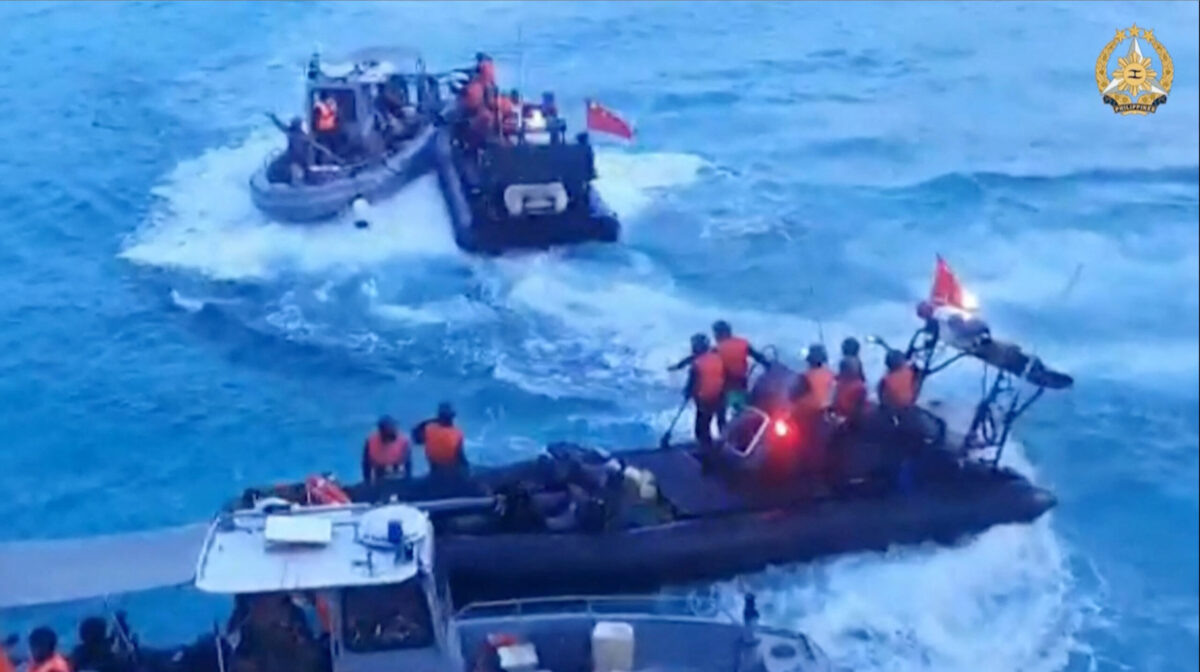US, India, Japan, Australia denounce coercive actions in East, South China Seas

This frame grab from handout video footage taken on June 17, 2024 and released on June 25 by the Armed Forces of the Philippines shows Chinese Coast Guard personnel aboard rigid hull inflatable boats (in black) during a confrontation with Philippine Navy personnel on their respective vessels (in gray) near the Second Thomas Shoal in disputed waters of the South China Sea. The Philippines on June 24 denounced Beijing’s “aggressive and illegal use of force” during last week’s South China Sea clash between its navy and the Chinese coast guard. Beijing insisted its coast guard behaved in a “professional and restrained” way and blamed Manila for the clash. (Photo by Handout / ARMED FORCES OF THE PHILIPPINES / AFP)
MANILA, Philippines — The foreign ministers of India, the United States, Japan, and Australia jointly expressed their opposition to “any unilateral actions that seek to change the status quo” in the East and South China Seas “by force or coercion.”
The four top diplomats met in Washington on July 1 to reaffirm their steadfast commitment to a free and open Indo-Pacific.
As four leading maritime nations in the Indo-Pacific, the quad ministers said they are united in their conviction that “peace and stability in the maritime domain underpin the security and prosperity of the region.”
READ: China ships challenge PCG, BFAR vessels setting fishing devices
“We are committed to a region where all countries are free from coercion and strongly oppose any unilateral actions that seek to change the status quo by force or coercion,” they said in a joint statement on Tuesday.
The ministers particularly noted that they remain seriously concerned about “dangerous and provocative actions,” including interference with offshore resource development, the repeated obstruction of the freedoms of navigation and overflight, and the dangerous maneuvers by military aircraft and coast guard and maritime militia vessels, especially the unsafe use of water cannons and ramming or blocking actions in the South China Sea.
READ: PH wins arbitration case over South China Sea
“These actions threaten peace and stability in the region. We are seriously concerned by the militarization of disputed features. We emphasize the importance of upholding freedom of navigation and overflight, other lawful uses of the sea, and unimpeded commerce consistent with international law, as reflected in the United Nations Convention on the Law of the Sea,” said the foreign ministers.
“We affirm that maritime disputes must be resolved peacefully and in accordance with international law, and reiterate that the award rendered by the Arbitral Tribunal on July 12, 2016 is a significant milestone and the basis for peacefully resolving disputes between the parties,” they emphasized.
While the foreign ministers did not particularly name any aggressor, the Philippines and China have clashed numerous times in the South China Sea around territories that fall inside Manila’s exclusive economic zone.
China’s most recent dangerous act in the territory transpired on June 20 when a Chinese Coast Guard Vessel harassed and water cannoned two vessels manned by Filipino fishermen in Panatag Shoal.
The Philippine Coast Guard said the vessels were deployed to distribute fuel subsidies to the fishing community in the area.
China’s continued aggression in Philippine waters is borne out of a sweeping claim over most of the South China Sea, including the West Philippine Sea.
It, however, has long been dismissed by an arbitral tribunal. /dl


















